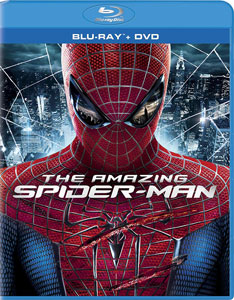Like what the Dark Knight Trilogy is to the 1990s “Batman” movies, and what the 21st century “Superman” films are to the Christopher Reeve versions, “The Amazing Spider-Man” (2012) gives us a darker alternative to Sam Raimi’s “Spider-Man” trilogy.
This approach only makes creative sense for Batman, since he has long been a Dark Knight in the comics, fighting villains from nightmares. And indeed, when watching “The Amazing Spider-Man,” I couldn’t help but think how much more tonally appropriate the 2002 “Spider-Man” is. But while “Amazing” isn’t a good Spider-Man movie, it’s not a bad movie in a vacuum.
New cast takes over
To play devil’s advocate, this movie isn’t a bad way to go if we assume Sony shareholders are demanding a new Spider-Man movie and they couldn’t get the Raimi/Maguire/Dunst team back together. Now, I’d rather this was a fourth film in that continuity, with roles recast like how the 1990s “Batmans” did it, because I prefer long-running sagas as opposed to the stop-and-start-over approach.

“The Amazing Spider-Man” (2012)
Director: Marc Webb
Writers: James Vanderbilt, Alvin Sargent, Steve Kloves
Stars: Andrew Garfield, Emma Stone, Rhys Ifans
But I can see why the studio was uncomfortable asking its actors to continue their characters from iconic performances, and opted to start a new narrative that’s so different in tone that it can be viewed as a separate thing.
Oddly enough, Andrew Garfield, 28 at the time, and Emma Stone, 23 at the time, arguably could’ve played adult versions of Peter Parker and Gwen Stacy. I didn’t have too much trouble accepting them as high school students – I flipped a switch in my brain to accept the “90210” version of high schoolers – but it will be nice if they have graduated by the time of the 2014 sequel. Stone is watchable in everything, and Garfield calls to mind a less-stiff Hayden Christensen.
If Tobey Maguire is an emo Spidey, Garfield is a mumblecore Spidey. Indeed, the scene where Peter asks Gwen out doesn’t feature a complete sentence from either of them, as writers James Vanderbilt, Alvin Sargent (returning from the Raimi films) and Steve Kloves use the familiarity of the scene to their advantage, giving us a chuckle at how the asking-out process can be done in shorthand.
Director Marc Webb’s experience with young-love stories, notably “(500) Days of Summer,” no doubt helped the actors too, although I can’t shake the feeling that Gwen likes Peter because he’s hot. Not that Maguire is ugly, but let’s just say it’s clear MJ likes him for who he is on the inside.
Familiar beats
“Amazing” usually falls short of “Spider-Man” (2002) in beat-by-beat comparisons, simply because it didn’t get there first. Sally Field and Martin Sheen are of course fine actors as Aunt May and Uncle Ben, but “Amazing” thinks it is giving us more of Peter’s relationship with his surrogate parents simply by giving them more screen time; all that does is make the movie longer. The extra details – for example, we see Ben get shot by the criminal — don’t provide extra insight.

Fitting with the “Spider-Man in a realistic Dark Knight world” aesthetic, Peter’s transformation into Spider-Man is tech-based, as he gets bitten by an experimental gene-spliced spider in an OsCorp lab he isn’t supposed to enter.
This version of Spidey isn’t quite as superpowered, as his web-slingers come from a tech device rather than his wrists themselves, he can’t crawl or leap with quite as much abandon, and he heals more slowly. Still, it’s inevitable that a viewer will think back to the fun of the 2002 film and find this more reality-based version to be less appealing.
“Amazing’s” concern with reality does lead to a few smart notions. Crane operators, realizing Spidey is a good guy, line up their cranes to help him swing through the city to his final showdown with the villain, The Lizard (Rhys Ifans). The Raimi films assume viewers won’t think about what Spidey’s webs are attached to since it’s so fun to watch him swing among buildings.
The Lizard’s plot to turn everyone into superhumans nicely draws from the horrifying real event of the U.S. government’s 1950s and ’60s experimental chemical spraying in St. Louis. And Peter’s breakup with Gwen rings truer than the Peter-Mary Jane breakup in the ’02 film, as he is honoring the dying wish of Captain Stacy (Denis Leary).
Mystery doesn’t connect
Some of the foreboding mystery early in the film is hollow, because we know it’s leading toward Dr. Connors experimenting on himself and turning into The Lizard, since all “Spider-Man” villains take that path. But there’s also an undercurrent that Peter’s deceased father, Richard (Campbell Scott), was involved in some sort of sinister experiment with Connors back in the day. We don’t find out what that is, but a mid-credits tease suggests it’ll be important in the sequel, and I admit I’m intrigued.
Ultimately, though, “The Amazing Spider-Man” is less than amazing because it’s not a Spider-Man movie; it’s a Batman movie with Spider-Man grafted on because Sony wanted to tap into the success of the Dark Knight trilogy but it owns the rights to Spider-Man, not Batman.
Webb and his team make as good a movie as they can within those parameters, and if there’s a theoretical viewer who knows nothing about Spider-Man going in, they might thoroughly enjoy “Amazing.” But decades of comic books have found Spidey to be a big-hearted, mostly positive-thinking teenager rather than a brooder. Switching the tone is an interesting experiment, but it can’t possibly compete with the Spidey we’ve already accepted and loved.

